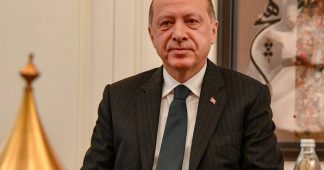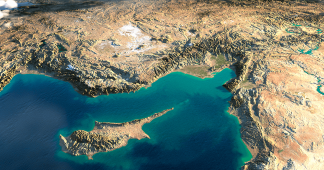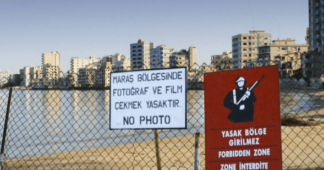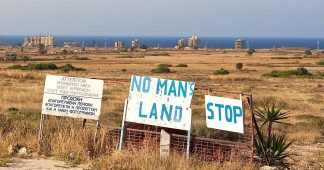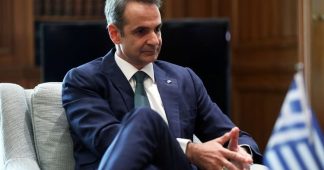If you read the following article by Professor Evriviades, dedicated to the memory of Gerasimos Tsigantes, you will get 50% of all information you need to know in order to understand Greek history from 1947 till now.
In 1964 US President Lyndon Johnson is pressing the Greek governement to accept the Acheson plan for Cyprus. As Greeks tell him that this plan runs counter to the Greek Constitution and that the Greek Parliament will not agree he says to the Greek Ambassador: “Fuck your parliament, Fuck your constitution”. Those were not empty words: One year later, in 1965, the King of Greece (an instrument of Americans himslef) dismisses the elected Prime Minister. Three years later (1967) the CIA is imposing a military junta in Athens. Ten years later (1974) the junta is organizing a coup against the Cypriot President (an exact copy of the 1973 coup against Salvador Allende), providing NATO member Turkey with the pretext it needed to invade the island.
The coup in Nicosia and the subsequent Turkish invasion are considered by some historians as one of the four biggest crimes commited by Henry Kissinger.
A Belated Memorial- Philip Deane (Philippe Deane Gigantes),1923-2004
By Marios L. Evriviades*
The book by Philip Deane- Philippe Deane Gigantes (Gerasimos Tsigantes, 1923-2004), I Should Have Died (New York: Atheneum, 1977) became known in Greece and Cyprus only because it contained the most important diplomatic “dialogue” ever recorded at the highest possible level on Greek-American relations and the Cypriot issue. In fact this “dialogue” of July 1964, between US President Lyndon B. Johnson and the Greek Ambassador to Washington Alecos Matsas, may be without precedent in the annals of recorded western diplomatic history.
It is in Deane’s book that this now infamous exchange between the two, that took place in the White House, is recorded verbatim. In the exchange the American President addressing the Greek Ambassador demands, in cesspool language, that Greece accept what later came to be known as the “first version” (there have been several) of the 1964 partitionist Acheson Plan for Cyprus. According to this plan the Republic of Cyprus- in existence since 1960- would have been partitioned with roughly half of its territory ceded to NATO state Greece, the rest to NATO state Turkey, while NATO state Great Britain would have continued retaining about 3% percent of Cypriot territory as a military base, in what amounted to a neo-imperialist arrangement. Cratocide would have been performed against the nascent Cypriot Republic by a coterie of NATO states. The most prominent precedent of such an act takes us back to Nazi Germany and the, albeit temporarily, of Czechoslovakia in 1939. Except that the dismemberment of the Cypriot state was meant and planned to be permanent.
Turkey had originally demanded the cession of the whole island in exchange of not military attacking it. But in 1964, with American mediation, Ankara
“generously” conceded to accept only half of it. The partitionist line would have ceded to Ankara the northern part of Cyprus, on a line running from the northern village of Kormakitis to the Turkish sector of the city of Famagusta, on the east cost. Once the American mediated partitionist agreement was sealed between Greece and Turkey, this already agreed dividing line would have been “drawn” by the then Secretary General of NATO, ostensibly for the “needs” of NATO regional security. Considering that more than 80% of the population of Cyprus consisted of Greeks with only 18% of Turks, the indigenous Greek majority population north of the partitionist line, would have been forced out of their ancestral land to make room for the Turkish military takeover. NATO would have been the facilitator and possibly even the enabler of this act of ethic cleansing, as well.
Additionally, the American President Lyndon Johnson had demanded that Greece cede to Turkey the island complex of Kastellorizo. As declassified American documents record, the Turkish Prime Minister Ismet Inonu had taken a “liking” to this Greek island complex off Turkey’s coast. And Johnson told the Greek Prime Minister at the time, George Papandreou, that since Inonu liked it, the island complex should be ceded to Turkey as well. Apparently Johnson considered this cession of Greek territory as an appropriate baksheesh for the “moderation” exhibited by the Turks during the American mediation.
The time of the Johnson- Matsas exchange was July 1964. In the context of the American mediation, it was preceded by visits from the Turkish and Greek prime ministers to Washington, following Johnson’s invitation. The prime concern of President Johnson at the time (as always for every American President who wants to continue in office) were the upcoming presidential elections in November. Johnson’s opponent was the ideologically extreme Republican candidate Barry Goldwater, who wanted to escalate the war in Vietnam while threatening the Soviets with nuclear war. Johnson’s campaign staff were “building” a profile of him as a “moderate” leader against his “warmongering” opponent. So they wanted to boost the international image of Johnson as a peacemaker between the two NATO rivals. It was in this context that the Greek and Turkish leaders were invited to the Camp David presidential retreat in the US for final negotiations. Turkish warmongering against Cyprus, in June 1964, provided the appropriate excuse. Papandreou refused a Camp David type of a meeting, but agreed to meet the US President bilaterally. Johnson thus met with the two leaders separately at the White House.
What follows is taken verbatim from the Deane book, pp.,112-114:
“Lyndon Johnson invited the Prime Ministers of Greece and Turkey to Washington. In a brief private meeting with Prime Minister Papandreou, he talked of partitioning Cyprus.
Papandreou said that even if he agreed with partition, he could never get the Greek Parliament to accept partition.
That was unfortunate, said Johnson, because if Greece did not agree with partition, then the United States would have to rethink the aid it was giving Greece within the framework of NATO.
‘All right,’ said Papandreou, ‘and in that case, Greece might have to rethink the advisability of belonging to NATO.’
‘Maybe Greece should rethink the advisability of a Parliament which could not take the right decision’, Lyndon Johnson replied.
Papandreou was weary after the meeting. The Greek Ambasssador to Washington, Alecos Matsas, congratulated Papandreou on refusing to be threatened- the Prime Minister had recounted his conversation with Johnson.
‘I regret that,’ said the Greek Prime Minister. ‘I regret speaking as I did. We are small. We can’t talk as if we were big. I can’t afford pride and yet I let my pride guide my thought.’ He left for Greece with the feeling that his days in power were numbered.
…
[Soon after the departure of the Greek PM from the American capital],
Alecos Matsas, the Greek Ambassador, was called by the White House. Lyndon Johnson listed the conditions of Acheson’s plan.
‘As Prime Minister Papandreou told you,’said Ambassador Matsas, ‘no Greek Parliament could accept such a plan. At any rate, the Greek constitution does not allow a Greek government to give away a Greek island.’
‘Then listen to me, Mr Ambassador,’ said Lyndon Johnson, ‘fuck your Parliament and your Constitution. America is an elephant. Cyprus is a flea. If those two fleas continue itching the elephant, they may just get whacked by the elephant’s trunk, whacked good.’
‘I shall communicate your views to the Prime Minister,’ said Ambassador Matsas. ‘But I have already told you what the Prime Minister’s answer will be: Greece is a democracy; the Prime Minister cannot act against the wishes of Parliament.’
‘Let me tell you what answer I will give if I get that sort of reply back from your Prime Minister;’ said Lyndon Johnson. ‘Who does he take himself for, anyway? I can’t have a second de Gaulle on my hands. We pay a lot of good American dollars to the Greeks, Mr Ambassador. If your Prime Minister gives me talk about Democracy, Parliament and Constitutions, he, his
Parliament and his Constitution may not last very long.’
‘I must protest your manner, Mr President,’ said Alecos Matsas. ‘As the representative of Greece, an ally of your country,
I cannot accept such treatment.’ Lyndon Johnson shouted: ‘Don’t forget to tell old Papa what’s his name what I told you. Mind you tell him. You hear?’
The Ambassador was trembling with humiliation. He asked me into his office and told me what had happened. I congratulated him on his stand. He shook his head hopelessly: ‘They’ll overthrow the government. I am a royalist. I want the young King to be a rallying point for the Greek nation. I am mortally afraid that he will be badly advised by the Americans now and that he will act unconstitutionally, endangering the throne!
Mr Matsas wrote his report giving a full accounting of what President Johnson had said; a fastidious man, Alecos Matsas found it repugnant to record the coarse words the US president had used. Finally the report was done, with every last vulgarity. The Ambassador gave it to the coding clerk who started sending on the radio teleprinter we had purchased from the Americans. This is a machine that automatically codes a message. The machine is supposed to have the capacity to vary its codes infinitely so that deciphering should be impossible.
Within minutes after the message was sent, Ambassador Matsas received a telephone call from Lyndon Johnson:
‘Are you trying to get yourself in my bad books, Mister Ambassador?’ asked Johnson. ‘Do you want me to get really angry with you? That was a private conversation me and you had. You had no call putting in all them words I used on you. Watch your step.’ And the President of the United States hung up.
Do you think,’ Ambassador Matsas asked me ‘that the Americans have sold us a tricked coding machine?’ ‘
Thereafter, when we had messages we wanted to keep super
secret, we did not send them on the machine; we did not write
them down: we flew to Athens and told the Prime Minister what he needed to know.”
Who was Philip Deane (Gerasimos Tsigantes)?
In July 1964 Philip Deane was the Press Counsellor of the Greek embassy in Washington. Before that he had an illustrious career. He was a veteran of WWII with service in the British Navy (perhaps naval intelligence), continuing a family tradition of service- as British citizens- with with British Forces during WWII. His father also led Greek forces in the liberation of the Dodecanese islands from the Germans in the final stages of the war, while his uncle was in the resistance in Athens as a British officer. (He was betrayed in that capacity and killed by Italian forces. But not before he killed six soldiers with his revolver. His body was left to rot in place until some Greek women, defiant modern Antigonies, buried it).
After the war Deane became a journalist with the London Observer. There he was given the pen name ‘Philip Deane’. During the Korean War he was captured by the communists, jailed and tortured, accused of being a British agent. Because of his impressive credentials he was invited back to Greece and initially appointed as Secretary to the young Greek King. His service there was short lived. He soon broke ideologically with the King and his Court and joined the newly elected George Papandreou government as Minister of Culture.
On account of his record and past service as a journalist in Washington, Deane had privileged access to the entire power structure of the American capital. He knew personally power brokers in the city like Dean Acheson. He had even hired him, on the advise of Bobby Kennedy as lobbyist for the Cyprus cause, something that actually boomeranged on account of Acheson’s subsequent behaviour. The details he provides in his book of his relationship with him are fascinating and mostly unknown. Deane was also friends with the Kennedys and, again, he records unknown details of conversations with Bobby Kennedy and his invaluable advise on how to handle Greek- American relations and, especially, how to cope with the CIA.
Philip Deane was an accomplished professional. He kept copious notes of his meetings with the power brokers of Washington. His book is a treasure of hardly known anecdotes of historic significance, not only for a country like Greece but also for the kind of power politics powerful states practice, expecting compliance from vassal states.
In the case of the Matsas telegram, Deane did not have much work to do. He simply copied it. And thank God he did. Otherwise not in a thousand years would Johnson’s historically loaded obscenities would have ever seen the light of day out of the archives of the Greek Foreign Ministry.
It is very unfortunate that I Should Have Died was never translated and published in Greece. I do not know whether any attempts have ever been made by Greek publishers and what problems, if any, may have intervened to prevent publication.
Only half of the book is about Greece. The first part is about Deane’s experiences as a prisoner of war in North Korea. He interfaces his experiences as a POW with those he later experienced in his confrontation with CIA operatives in Greece. Deane provides fascinating details about the CIA obsession with Andreas Papandreou and the extent it went to defame him with an array of dirty tricks. Deane himself was subjected to such tricks as well.
Most importantly, however, Deane reveals how in cooperation with the Palace and the extreme right in Greece -its NATO Army and right wing ideologues in the Palace and elsewhere- American operatives facilitated political destabilisation from 1964 onwards. In 1965 PM Papandreou was forced to resign in a conflict with the young King Constantine over the control of the Greek army. This
destabilisation process did not come to an end until the Greek NATO coupists produced yet another coup, this time in Cyprus, in 1974. The 1974 coup acted as an open invitation for NATO state Turkey to finally attack, occupy and partition de facto, the Republic of Cyprus.
Fascinating and historically important though the Johnson-Matsas exchange may be, the value of I Should Have Died lies more with the fascinating and hardly known details and the relevant analysis that the author provides, about the pre-1967 period. It is my view that without Deane’s opus, understanding the process of subversion of the fragile Greek democracy and the 1967 coup is incomplete.
Those Greeks that have had no experience of the pre-1967 period, which is most of them, and who try to make historical sense of it, can have no better beginner’s guide than reading I Should Have Died. They will get a good grasp of how backroom deals, political machinations and conspiracies are organised and implemented, how foreign operatives work in the fog of untruths and disinformation in cahoots with local enablers, how fascism is incubated and, finally, how authority loses its legitimacy and becomes a pursuit of power for its own sake.
* Professor Neapolis University Pafos
May 2023
Also read
A nation betrayed
We remind our readers that publication of articles on our site does not mean that we agree with what is written. Our policy is to publish anything which we consider of interest, so as to assist our readers in forming their opinions. Sometimes we even publish articles with which we totally disagree, since we believe it is important for our readers to be informed on as wide a spectrum of views as possible.
